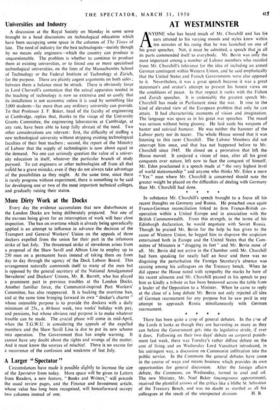A discussion at the Royal Society on Monday- in some
sense brought to a head discussions on technological education which have been occupying some space in the columns of The Times of late. The need of industry for the best technologists—mainly though by no means only engineers—which the country can produce is unquestionable. The problem is whether to continue to produce them at existing universities, or to found one or more specialised technological universities, on the lines of the Massachusetts School of Technology or the Federal Institute of Technology at Zurich, for the purpose. There are plainly cogent arguments on both sides ; between them a balance must be struck. There is obviously force in Lord Cherwell's contention that the actual apparatus needed in the teaching of technology is now so extensive and so costly that its installation is not economic unless it is used by something like 3,000 students—far more than any ordinary university can provide. To that Professor J. F. Baker, head of the faculty of engineering at Cambridge, replies that, thanks to the visiop of the University Grants Committee, the engineering laboratories at Cambridge, at any rate, have been able to keep fully abreast of the need. Two other considerations are relevant: first, the difficulty of staffing a new technological university without stripping existing technological faculties of their best teachers ; second, the report of the Ministry of Labour that the supply of technologists is now about equal to the demand. No one can seriously question the value of a univer- sity education in itself, whatever the particular branch of study pursued. To cut engineers or other technologists off from all that world be a grave mistake, even if they do not always take advantage of the possibilities as they might. At the same time, since there is rarely progress without experiment, there is something to be said for developing one or two of the most important technical colleges, and gradually raising their status.






































 Previous page
Previous page